Even 8% of Black Workers Knock Attention It Gets
Cheers for Student Urging Diversity at City’s Daily
Media Push Back on Trump’s Claim of ‘Mandate’
. . . Was It Really Just ‘the Economy, Stupid’?
Trump Tells Allies in Congress to Block Shield Law
Uncertain Future for MSNBC, Choice of Viewers of Color
Out: Brent Jones, Stephen Henderson, Earl O. Hutchinson
Israel Cracks Down Further on Foreign Media
‘PBS News Hour’ Looks at Cruelty of Haitian Gangs
Cuban Blackouts Saw Clampdown on Press Freedom
From PBS: Desperate Journey from Cameroon to U.S
Short Takes: International Press Freedom Awards; Mark Trahant; alert for nonprofits; Atlanta Journal-Constitution; Wayne Dawson; Univision’s San Francisco bureau; Ebony Reed; anti-sexist training by Uganda media women.
Homepage illustration credit: Chronicle of Higher Education; iStock
Support Journal-ismsDonations are tax-deductible.
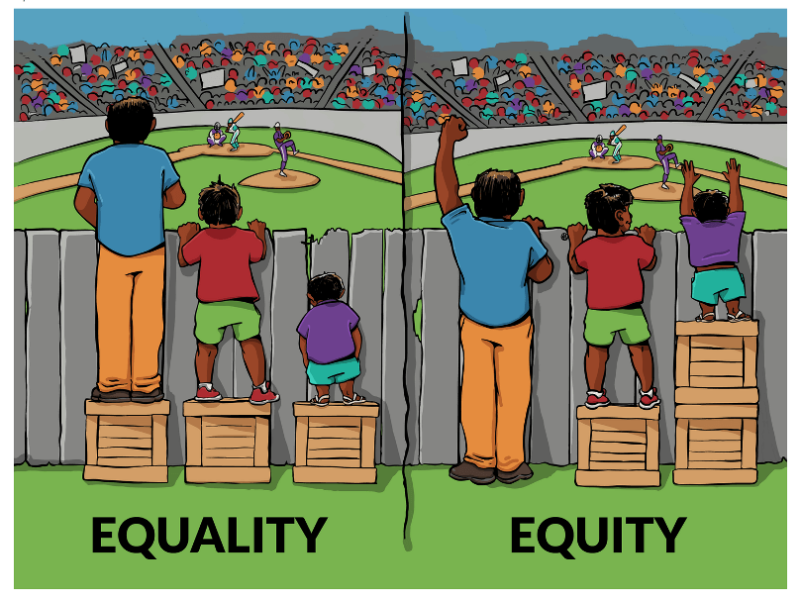
(Credit: Qualtrics.com)
Even 8% of Black Workers Knock Attention It Gets
“American workers’ opinions on the role of diversity, equity and inclusion efforts in the workplace have become more negative since last year, according to a new Pew Research Center survey,” Rachel Minkin reported Tuesday for Pew.
“Compared with February 2023, workers are now somewhat more likely to say:
- “Focusing on increasing DEI at work is mainly a bad thing.
- “Their company or organization pays too much attention to increasing DEI.”
Even 8 percent of Black workers say their company or organization pays too much attention to DEI, up from 3 percent in February 2023, Pew said, although 18 percent of Black respondents said their company or organization pays too little attention to DEI. But that’s down from 28 percent in 2023.
Despite the alarm these figures might generate, corporate support is not necessarily following those sentiments.

“With many in the private sector braced for turbulence, Joelle Emerson, co-founder and CEO of diversity strategy and consulting firm Paradigm, has a less pessimistic view,” Jessica Guynn reported Friday for USA Today. “She said the impact of the election and a second Trump presidency remains to be seen.
“Over 60% of corporate executives surveyed by The Conference Board viewed the current political climate for corporate DEI as very or extremely challenging, with most anticipating continued or escalating pushback.
“Even so, fewer than 10% of the organizations planned to scale back their DEI commitments over the next three years. Research shows employees want diverse and inclusive workplaces, DEI advocates say, and corporations will also face pressure from progressive forces over the next four years.
“ ‘Instead of abandoning diversity, equity and inclusion, I think we’ll see companies adjust,’ Emerson said.”
Guynn also wrote, “In the face of mounting attacks, business leaders shored up DEI programs to make them less vulnerable to legal challenges and public criticism.
“They have backed away from initiatives like hiring targets that conservatives claim are illegal quotas and from executive bonuses tied to DEI goals.
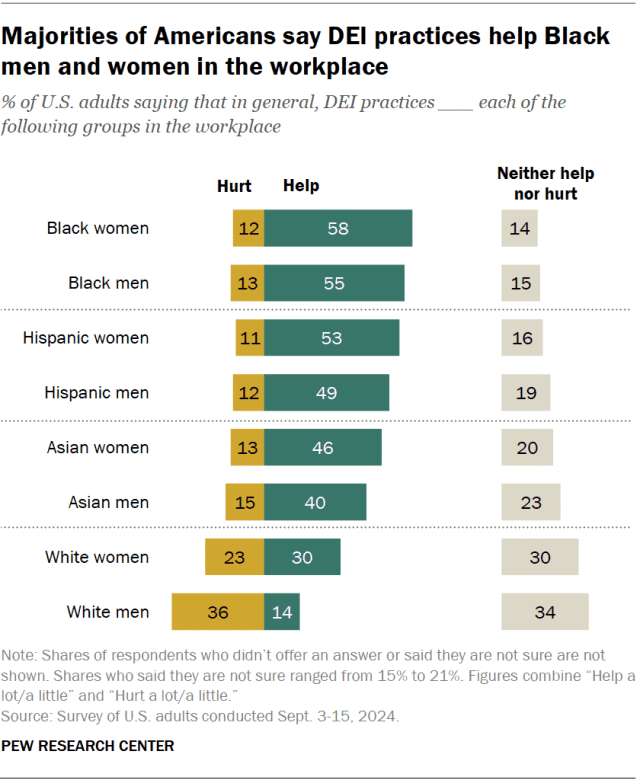
“More than half of senior executives surveyed by the Conference Board said they had adjusted how they refer to DEI over the past year. Another 20% were considering doing so. A growing number have dropped mentions of diversity goals in shareholder reports. . . .”
The Chronicle of Higher Education, which is tracking the status of DEI in higher education, explains, “Republican politicians in early 2023 launched an assault on colleges’ diversity, equity, and inclusion efforts to recruit and retain faculty and students of color.
“While college administrators say their so-called DEI efforts are an effective strategy to repair decades of exclusionary policies and practices that repelled communities of color from their campuses, Republican leaders say the practices violate free speech, break antidiscrimination laws, and are a misuse of public money.“
Their campaign is making headway with the public, though with far from a majority. According to the Pew report, “About four-in-ten Republican and Republican-leaning workers (42%) now say focusing on DEI is a bad thing, up from 30% last year. The share of Republicans who offer a neutral view has dropped 8 points, while the share who see it as a good thing is virtually unchanged.
“Among employed men, 29% say focusing on DEI is a bad thing, up from 23% who said this in February 2023. The share of male workers who see this as a good thing has dropped 6 points, from 50% in 2023 to 44% today.
“Asian workers have also become less likely since 2023 to see DEI efforts as a good thing: 57% of Asian workers say this, down from 72%. More Asian workers now offer a neutral view of DEI than did so last year. About three-in-ten (28%) now say focusing on DEI is neither good nor bad, compared with 18% in 2023.
“There has been little change in views of DEI as a good thing among White and Black workers. However, among White workers, a growing share say DEI is a bad thing: 27% say this today, up from 21% in 2023. . . .
“White, Black and Hispanic workers are now slightly more likely to say their company or organization pays too much attention to increasing DEI than they were in 2023.
“The views of Asian workers on whether their company or organization pays too much or too little attention to DEI have not changed significantly since 2023. . . .”
- Journal-isms: Diversity Quest Just Got Harder (Nov. 13)
Cheers for Student Urging Diversity at City’s Daily
It’s been a week since this columnist posted a letter to the Baltimore Sun from a Morgan State University student outlining reasons why the Sun should “reflect the diverse experiences of people of color.
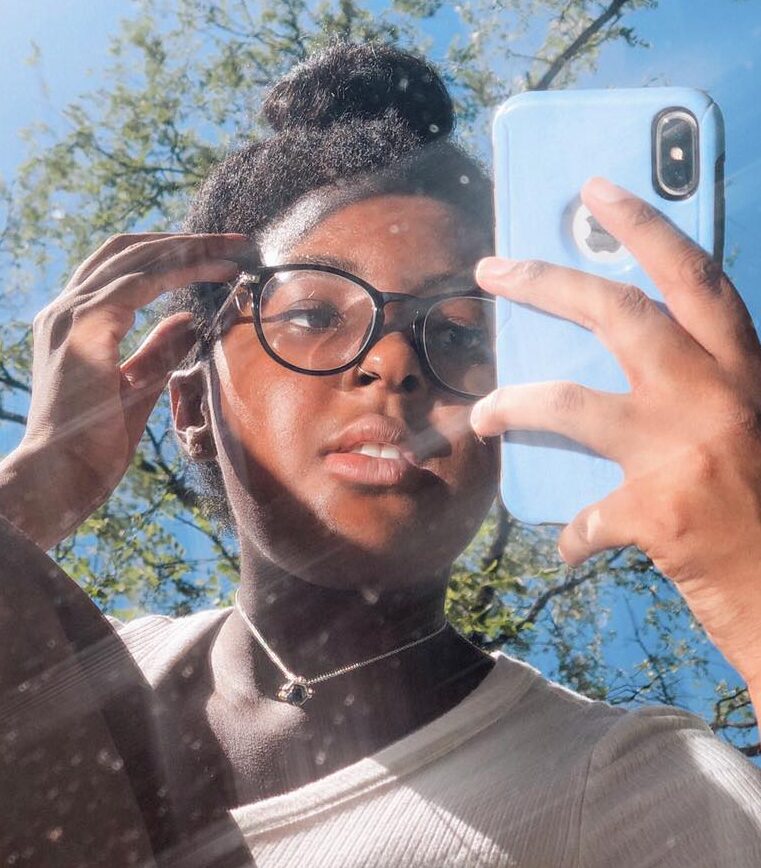 “Given that 60% of the city’s population identifies as Black,” wrote Jordynn Blackwell (pictured), a strategic communications major in the class of 2026, “it would be wonderful to see more coverage that represents this demographic, as well as other minority communities, including Hispanic, Latino and Asian groups.”
“Given that 60% of the city’s population identifies as Black,” wrote Jordynn Blackwell (pictured), a strategic communications major in the class of 2026, “it would be wonderful to see more coverage that represents this demographic, as well as other minority communities, including Hispanic, Latino and Asian groups.”
The letter has so far racked up more than 100 Facebook comments from journalists, such as, “Is Jordynn Blackwell thinking about graduate school? If so, hit me up,” “Brilliant young people like Jordynn Blackwell allow us to hope,” and “Kudos to her for trying to light a candle in that darkness…!”
Blackwell told Journal-isms that she was “surprised to see that my letter received so much praise. I honestly didn’t expect many people to read it or resonate with what I wrote, but I am glad it was well received. My feelings expressed in the letter were genuine. In today’s world, I believe journalism must serve as a platform that shares diverse perspectives. After the recent election, I sense that our nation is heading in a direction where minority voices are being silenced by those in power, both strategically and systematically.”
 However, the sentiments of those 100+ haven’t reached Sun Opinions Editor Jonathan Carter (pictured), on whose pages the letters run. Carter messaged Journal-isms Wednesday, “Surprisingly, the response has been nonexistent, both from readers and internally.
However, the sentiments of those 100+ haven’t reached Sun Opinions Editor Jonathan Carter (pictured), on whose pages the letters run. Carter messaged Journal-isms Wednesday, “Surprisingly, the response has been nonexistent, both from readers and internally.
“I support a robust opinion page, including what readers perceive to be issues in our coverage. And, of course, I’m always game to take pointers from readers.”
Blackwell’s message to Journal-isms continued, “As Vice President Kamala Harris mentioned during her campaign, we seem to be regressing to a dark era in our country, undoing decades of social justice and societal progress. Returning to my main point, our news outlets in a diverse city like Baltimore should reflect that diversity.
“It is unacceptable for the coverage of Morgan State University or Coppin State University to focus solely on stories about shootings or violence on campus. As a city that is home to two historically Black universities, we need more content that celebrates their rich culture and the joy they bring to the community, as well as their significance to Baltimore.
“There is so much more to this city than just crime and politics; its history and culture are compelling enough that even as an out-of-state student, I find myself wanting to stay here. . . . “
Blackwell’s letter to the Sun is republished at the end of this column.
- Shannon Bond, Tom Bowman, Odette Yousef, Quil Lawrence, NPR: What’s behind defense secretary pick Hegseth’s war on ‘woke’ (Nov. 15)
- Kevin Cokley, Diverse Issues in Higher Education: Using Black Students to Criticize DEI is a Cynical and Disingenuous Tactic
- Cheyanne M. Daniels, The Hill: Crockett lays into Republicans claiming oppression over DEI
- Rishabh Jaiswal, Kanjyik Ghosh and Shubham Kalia, Reuters: Walmart to roll back some diversity policies amid pressure from conservatives (Nov. 26)
- Julie Kratz, Forbes: Despite DEI Pushback, New Report Shows Companies Stay Committed To DEI
- Molly Minta, Mississippi Today via Associated Press: Governing board of Mississippi’s public universities deletes ‘diversity’ from several policies
- Cami Mondeaux, Washington Examiner: Defense contractors embracing DEI could be target of Trump’s second term
- David Weigel, Semafor: Poll: One in five Americans or fewer use ‘woke’ terms
Media Push Back on Trump’s Claim of ‘Mandate’
“On the night he won a second term, President-elect Donald J. Trump rejoiced in the moment,” Peter Baker wrote Friday for The New York Times. ” ‘America has given us an unprecedented and powerful mandate,’ he boasted. In the two and a half weeks since, his campaign has repeatedly heralded his ‘landslide,’ even to market Trump merchandise like the ‘Official Trump Victory Glass.’
“But by traditional numeric measures, Mr. Trump’s victory was neither unprecedented nor a landslide. In fact, he prevailed with one of the smallest margins of victory in the popular vote since the 19th century and generated little of the coattails of a true landslide.”
In The Washington Post, Aaron Blake wrote Wednesday, “a more holistic look — at races not just for president and the Senate but also for the House and state legislatures — reinforces the reality that voters actually didn’t shift toward Republicans that much. . . . “
On the “PBS NewsHour” Friday, host Amna Nawaz asked commentator Jonathan Capehart whether Trump has a mandate. “No, I don’t see it as a mandate, but I see how he thinks it is,” Capehart replied.
“But they say that they have a mandate simply because he won the White House, Republicans held onto the majority in the House, and they retook the majority and have 53 seats in the Senate. And so a governing trifecta in Washington, I think, is fueling this idea that they have a mandate.
“But what we’re going to see once he comes into office and starts acting on all of the things he told us he was going to do, we will see whether the American people believe he has a mandate to do all the things he’s promised, including mass deportations on day one.”
Said New York Times columnist David Brooks in the same conversation, “In the general election, 70-odd-million voted for him. And [my colleague David French] makes the point that those 17 million, the primary voters, are hardcore Trump people. Those are MAGA people. A lot of the 70 million, they just want the economy of 2019 back. They’re not supporting the whole MAGA thing.
“And so there’s some hope that, as Trump does MAGA-type stuff, like appointing Matt Gaetz, then a lot of the people who are his supporters, but not really on board for the whole circus, will pull back and he will begin losing popularity.
“And Trump wants nothing more than to preserve his popularity, and he will hear the voices of the Republicans who are pulling back and he will do some U-turns.”
. . . Was It Really Just ‘the Economy, Stupid’?
Separately, a debate continued over how much race and gender played a role in Trump’s victory over Vice President Kamala Harris, with author and academic Eddie Glaude contending they played a larger role than many acknowledge, but Rep. Hakeem Jeffries, D-N.Y., House Democratic leader, insisting that those concerns were overshadowed by economic ones.
“I know that there are those who are making the claim that this is evidence that the Democratic Party has, you know, lost its way in relation to working-class people,” Glaude told Juana Summers Wednesday on NPR.
“I don’t think that’s necessarily true, particularly because Black and brown working-class people did not vote for Trump in overwhelming numbers, so we need to unpack what we mean by the working class. We see split-ticket voting. We saw Democrats in some places — Democratic senatorial candidates win, or they didn’t lose by the same number or margins as Vice President Harris.”
Jeffries argued on ABC-TV’s “The View” that the primary takeaway from this election was that the high cost of living had put a huge burden on most Americans and made the American dream unattainable,” Kristine Parks reported Friday for Fox News.
- Journal-isms: Can a President Really Control Prices? Depends (June 6) (scroll down)
- Journal-isms: Perceptions Trump Facts on ‘Better Off’ Question (Oct. 21) (scroll down)
Trump Tells Allies in Congress to Block Shield Law
“President-elect Donald J. Trump on Wednesday instructed congressional Republicans to block the passage of a bipartisan federal shield bill intended to strengthen the ability of reporters to protect confidential sources, dealing a potentially fatal political blow to the measure — even though the Republican-controlled House had already passed it unanimously,” Charlie Savage reported Wednesday, updated Thursday, for The New York Times.
“The call by Mr. Trump makes it less likely that the bill — the Protect Reporters from Exploitative State Spying Act, or PRESS Act — will reach the Senate floor and be passed before the current session of Congress ends next month. Even one senator can hold up the bill, chewing up many hours of Senate floor time that could be spent on confirming judges or passing other legislation deemed to be a higher priority. . . .”
Meanwhile, other journalists reported on the incoming administration’s plans to exact revenge on the press.
- Marisa Abrajano, Marianna Garcia, Aaron Pope, Robert Vidigal, Joshua A Tucker, Jonathan Nagler, PNAS Nexus, National Academy of Sciences: How reliance on Spanish-language social media predicts beliefs in false political narratives amongst Latinos
- Zeeshan Aleem, MSNBC: Trump’s administration picks are made for TV — not for governing
- Johanna Alonso, Inside Higher Ed: Student Voter Engagement Efforts Grew in 2024. Student Voting Didn’t.
- Perry Bacon Jr., Washington Post: A winning strategy is hidden in these 4 theories on Harris’s loss
- Dan Balz, Washington Post: Economy and discontent were too much for Harris to overcome, advisers say
- Charles M. Blow, New York Times: Trump’s Victory and the End of the Rainbow Coalition (Nov. 12)
- Meghnad Bose, Columbia Journalism Review: Hanging off the Line: Election polls were largely accurate. But the stories we tell about them are often distorting.
- Jamelle Bouie, New York Times: Trump’s Crown Doesn’t Fit
- Jamelle Bouie, New York Times: There Is a Reason Trump Wants Fewer Adults in the Room (Nov. 15)
- Graham Lee Brewer, Associated Press: New study shows voting for Native Americans is harder than ever
- Jim Dunford and Mark Updegrove, Current: Pendulum swings, cultural backlash and rhythms of democracy: What President Trump’s victory means for history
- Joe Flint and Drew FitzGerald, Wall Street Journal: Trump vs. Media Moves Back to the White House (Nov. 14)
- LZ Granderson, Los Angeles Times: Aiding Ukraine has been cheap. Caving to Russia would be far more costly
- Renee Graham, Boston Globe: America’s great white reckoning again
- Renee Graham, Boston Globe: House Republicans’ anti-trans bathroom rules should be flushed down the toilet
- Renee Graham, Boston Globe: President Biden should pardon his son Hunter
- Nathan Heller, New Yorker: Republican Victory and the Ambience of Information
- Emily Hockett, Reporters Committee for Freedom of the Press: How Trump’s first administration threatened press freedom at the border
- Jameel Jaffer, the Guardian: Don’t assume the first amendment will thwart Trump’s pro-censorious agenda
- Ariama C. Long, New York Amsterdam News: Post-election stress: Black women and their mental health
- Ruben Navarrette., Creators Syndicate: How Rubio ruined ethnic pride for me
- Ruben Navarrette, Creators Syndicate: Mass Deportations Would Be An Ugly Chapter for a Nation That Should Have Turned the Page (Nov. 14)
- Radio & Television Business Report: Rosenworcel Confirms Departure From FCC In January
- Eugene Robinson, Washington Post: Trump is casting for a reality show, not a Cabinet
- Michael J. Socolow, Nieman Lab: What should journalists do when the facts don’t matter? (Nov. 13)
- Kimberly Atkins Stohr, Boston Globe: Will Supreme Court check Trump? Don’t count on it.
- Max Tani, Semafor: In a frank internal meeting, The New York Times wrestled with its political role (Nov. 4)
- Mark Trahant, ICT: Rethinking government (again)
- Julio Ricardo Varela, Columbia Journalism Review: Complicating the Latino-Voter Story (Nov. 15)
- Sakshi Venkatraman, NBC Asian America: As Harris, Ramaswamy, Usha Vance rose on national stage, Indian Americans faced harassment (Nov. 15)
- Carlton Winfrey, Seattle Times: Black men and women can recapture the power of the vote (Oct. 25)
- Kimmy Yam, NBC Asian America: As sources say Trump could deport undocumented Chinese first, Asian American groups rush to prep (Nov. 15)
MSNBC President Rashida Jones, third from left, was part of a panel assembled by the NBCUniversal News Group at the joint convention of the National Association of Black Journalists and the National Association of Hispanic Journalists in Las Vegas in 2022. Jones joined, from left, moderator Alicia Menendez of MSNBC; Byron Pitts of ABC News; then-ABC News President Kimberly Godwin, then-NBC News President Noah Oppenheim, and then-CBS News President and Co-head Neeraj Khemlani. (Credit: Facebook) (video)
Uncertain Future for MSNBC, Choice of Viewers of Color
“Comcast revealed on Wednesday plans to spin off MSNBC, CNBC and other cable assets into a company that’s separate from the NBC broadcast network,” Matt Egan reported Thursday for CNN.
“The spinoff itself won’t require approval from the [Justice Department] or the Federal Communications Commission. But it’s widely expected the spinoff company will need to find a dance partner to make it through the world of cord-cutting. That will give Trump-appointed regulators an opportunity to damage a network he’s clashed with for many years.
“’There are only two media entities that Donald Trump dislikes more than CNN. One is MSNBC and the other is NBC,’ Craig Moffett, a media veteran and founder of MoffettNathanson, said in a phone interview. . . .”
As MSNBC announced last year, its programming “attracts the most diverse cable audience in America. In 2023, MSNBC was the #1 network across all of cable among Black viewers for the 6th consecutive year and in Asian viewers. Among Hispanic viewers, MSNBC was #1 across cable news and #2 across all of cable (behind ESPN). MSNBC is home to the Top 20 highest-rated cable news programs among Black Americans. MSNBC’s ‘PoliticsNation with Al Sharpton‘ had the highest concentration of Black viewers (41%) of any program on cable news.”
“ ‘We could all be fired a year from now,’ Morning Joe cohost Joe Scarborough quipped Wednesday morning while addressing some big news on the home front,” Natalie Korach reported Wednesday for Vanity Fair, “which is that Comcast plans to spin off its NBCUniversal cable TV networks, including MSNBC. ‘Or tomorrow,’ cohost Mika Brzezinski chimed in. . . .
“It’s under that somewhat ominous backdrop that MSNBC president Rashida Jones and NBCUniversal Media Group chairman Mark Lazarus, who will helm the new spin-off company, addressed senior leaders, producers, anchors, and hosts, including Rachel Maddow, Katy Tur, and Chris Jansing, according to sources present. During the Wednesday morning meeting, Lazarus assured staff the plan was to ‘unlock the value’ of the cable assets, according to one source present.”
“The prospect of being separated from NBC News has raised alarms among journalists at the company, because MSNBC and CNBC routinely share reportage, contributors and more, and because much of MSNBC’s daytime schedule is filled with correspondents affiliated with the more traditional NBC News, not the opinion programs that are MSNBC’s most-watched properties,” wrote Brian Steinberg for Variety.
MSNBC has averaged 550,000 viewers since Election Day, a 39 percent decline compared with the network’s average in October, John Koblin reported Nov. 13 for The New York Times. “In prime time, MSNBC’s audience has declined 53 percent, according to the Nielsen data.
“The opposite has happened at Fox News, MSNBC’s conservative rival. . . .”
Out: Brent Jones, Stephen Henderson, Earl O. Hutchinson
Three Black male media figures are out of their jobs, not all happily: Brent W. Jones, senior vice president/editor, training, culture and community at Dow Jones and the Wall Street Journal; Stephen Henderson, a former managing director of opinion and commentary at the Detroit Free Press, who hosted WDET radio’s “Created Equal”; and commentator Earl Ofari Hutchinson, whose weekly “The Earl Ofari Hutchinson Show,” was canceled by Pacifica radio station KPFK in Los Angeles.
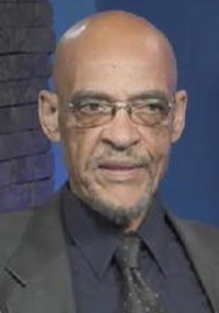 “Hutchinson (pictured) alleges that the actions leading to his show’s permanent removal from the airwaves are rooted in racist tactics, policies, and practices,” according to eurweb.com, with whom Hutchinson is affiliated.
“Hutchinson (pictured) alleges that the actions leading to his show’s permanent removal from the airwaves are rooted in racist tactics, policies, and practices,” according to eurweb.com, with whom Hutchinson is affiliated.
Similarly, Henderson (pictured, below) wrote on social media, “I’ve made this decision in response to nearly three years of disinvestment by the station in the show, and my work and ideas. That culminated during recent contract negotiations, when the station proposed cutting the show back to once a week, with no full-time staff assigned.
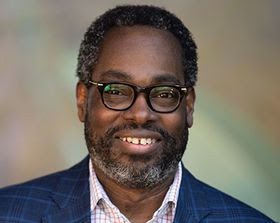 “The station faces severe financial difficulties and must make difficult decisions about which programming to keep, and support. But the proposed cuts to Created Equal represent, in my judgment, an unsustainable withdrawal of commitment to the show (the station’s most-listened-to local program) and its mission. Budgets are moral documents — statements of our values and priorities, reflections of the things we hold dear and those we see as expendable. WDET has chosen not to give Created Equal what it needs to thrive.”
“The station faces severe financial difficulties and must make difficult decisions about which programming to keep, and support. But the proposed cuts to Created Equal represent, in my judgment, an unsustainable withdrawal of commitment to the show (the station’s most-listened-to local program) and its mission. Budgets are moral documents — statements of our values and priorities, reflections of the things we hold dear and those we see as expendable. WDET has chosen not to give Created Equal what it needs to thrive.”
 The departure of Jones (pictured), who held a masthead position, “is not part of the layoffs at The Wall Street Journal earlier this week,” Chris Roush wrote for Talking Biz News Friday, and was announced internally in October.
The departure of Jones (pictured), who held a masthead position, “is not part of the layoffs at The Wall Street Journal earlier this week,” Chris Roush wrote for Talking Biz News Friday, and was announced internally in October.
Those layoffs included Politics editor Ben Pershing and others considered management, reportedly including some of color. Tim Martell, executive director of Dow Jones’ union The Independent Association of Publishers’ Employees, told Journal-isms the union had not been told the names of those laid off.
Spokespersons for the Wall Street Journal did not respond to questions about whether another person would fill the senior vice president’s position, in which diversity initiatives are a component.
Jones was described as leaving “to pursue other career interests,” and an Oct. 30 memo from Chief People Officer Dianne DeSevo said “Brent joined us 7 years ago and we are so grateful for his many contributions to the company,” listing highlights.
 [Update: Eugene Daniels and Rachael Bade reported Nov. 27 for Politico: “FIRST IN PLAYBOOK — The WSJ recently laid off Kimberly Johnson (pictured), who worked for the paper for 10 years, most recently as election editor, Daniel Lippman reports. In her time at the Journal, she was head of WSJ Pro and deputy chief news editor. WSJ editor Emma Tucker last year sent a memo to staff saying Johnson had a ‘record of building and leading teams across the newsroom’ and said she had ‘sharp news judgement and digital prowess.’ She is an AP and Denver Post alum, and was a freelancer in West Africa.”]
[Update: Eugene Daniels and Rachael Bade reported Nov. 27 for Politico: “FIRST IN PLAYBOOK — The WSJ recently laid off Kimberly Johnson (pictured), who worked for the paper for 10 years, most recently as election editor, Daniel Lippman reports. In her time at the Journal, she was head of WSJ Pro and deputy chief news editor. WSJ editor Emma Tucker last year sent a memo to staff saying Johnson had a ‘record of building and leading teams across the newsroom’ and said she had ‘sharp news judgement and digital prowess.’ She is an AP and Denver Post alum, and was a freelancer in West Africa.”]
Detroit Metro Times said that “Henderson’s reputation for hosting fact-driven, fair, and engaging discussions has established him as a prominent voice in the Detroit community” and that “Henderson said he will now concentrate on other ventures, including Bridge Detroit, the nonprofit news and engagement platform he founded, and ‘American Black Journal,’ the weekly Detroit PBS show he hosts.”
As for Hutchinson, Fisher Jack wrote Nov. 15 for EURWeb.com that he “has dedicated over two decades to his weekly show, which had been a staple for listeners,” and listed him as a founding member of a the Los Angeles chapter of the National Association of Black Journalists.
“The incident has ignited discussions regarding labor practices and racial discrimination within the station and the broader Pacifica network, which was established in 1949 as a non-profit community radio network promoting progressive programming.
“As Hutchinson prepares to escalate this matter, he has indicated plans to disseminate press notices to Congressional communications watchdog chairpersons, media outlets, and social media platforms, drawing attention to what he terms unfair labor practices and racial discrimination. This situation raises critical concerns about accountability at community stations like KPFK, which has historically aimed to represent diverse voices, often spotlighting marginalized communities through its programming.”
Michael Novick, interim general manager of KPFK, and Stephanie Wells, executive director of the Pacifica Foundation, did not respond to requests for comment.
- Max Reinhart, Detroit News: Stephen Henderson, WDET part ways after 10-year run
- Chris Roush, Talking Biz News: Marfil among the WSJ layoffs in DC (Added Nov. 26)
- Frank Witsil, Detroit Free Press: Popular WDET-FM show host Stephen Henderson quits, highlighting newsroom woes
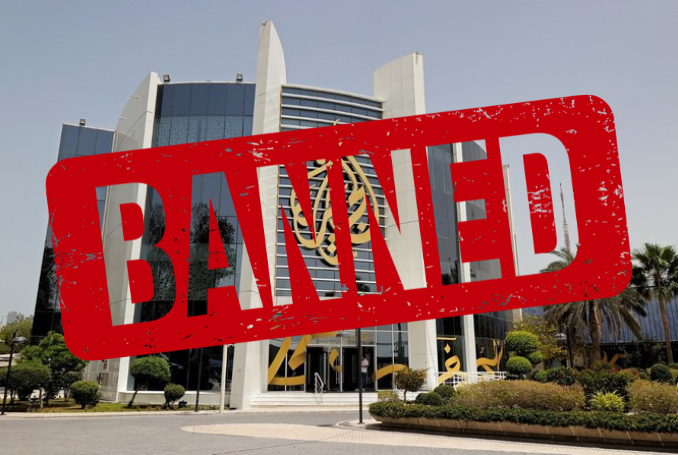
The Palestine Chronicle published this image April 1 after the Israeli Parliament, known as the Knesset, approved a new law, 70-10. granting Israeli Prime Minister Benjamin Netanyahu the power to ban foreign media outlets if they are deemed to be detrimental to Israel’s security. The measure has been dubbed “the Al-Jazeera law.”
Israel Cracks Down Further on Foreign Media
“As Israel’s war against Gaza and Lebanon rages on, Israel’s Communications Minister Shlomo Karhi is trying to reshape Israel’s media landscape,” Reporters Without Borders said Thursday.
“Between a law banning foreign media outlets that are deemed dangerous, a bill that would give the government a stranglehold on public television budgets, and the addition of a private pro-Netanyahu channel on terrestrial television exempt from licensing fees, the ultra-conservative minister is augmenting pro-government coverage of the news. Reporters sans frontières (RSF) is alarmed by these unprecedented attacks against media independence and pluralism — two pillars of democracy — and calls on the government to abandon these reforms.
“For several weeks now, Communications Minister Shlomo Karhi has been accelerating his agenda for reforming Israel’s media laws as the war in Gaza and Lebanon intensifies.
“The ‘Al-Jazeera law’, as it has been dubbed by the Israeli press, has just been tightened. This exceptional measure was adopted in April 2024 for a four-month period and renewed in July. On 20 November, Israeli MPs voted to extend the law’s duration to six months, and increase the law’s main provision — a broadcasting ban on any foreign media outlet deemed detrimental to national security by the security services — from 45 days to 60. . . .”
Meanwhile, “At least 135 Palestinian journalists and media workers have been killed, several have been injured and others are missing during the war in Gaza,” the International Federation of Journalists reported Thursday, saying that it and the Palestinian Journalists Syndicate (PJS) condemn the killings and continued attacks on journalists. The IFJ called for an immediate investigation into their deaths, listing many of them.
- Human Rights Watch: Lebanon: US Arms Used in Israeli Strike on Journalists (Nov. 25)
‘PBS News Hour’ Looks at Cruelty of Haitian Gangs
The “PBS NewsHour” Wednesday aired the first of two reports on Haitian gangs, by special correspondent Marcia Biggs and videographer Eric O’Connor.
In the first episode, Biggs reported, “This 41-year-old single widowed mother asked us to protect her identity. She says, in 2020, she was living on a front line between two gang territories when bandits attacked her home and murdered her mother, father and husband in front of her. She fled with her teenage son, and members of the Grand Ravine gang gave her a choice.
“They asked those who want to stand and fight, to fight. I chose to join [the gang] with my child,” the woman says. Biggs continued, “During one of those attacks, seven men stormed into Pierreline Jules’ home. She was raped, along with her mother and her niece.”
The second report examines the damage that the gangs are doing to children and teens: it is headlined, “Boys forced into gangs, girls face sexual abuse as Haiti violence robs childhoods.”
Left for further reporting: What motivates such cruelty?
- Committee to Protect Journalists: Haitian journalist attacked as gang violence again surges in country

The Cuban Institute for Freedom of Expression and the Press, an advocacy group for independent journalists, posted on Facebook about the censorship of YouTube creator Osmel González, above, and called on international human rights organizations and media outlets to continue to publicize violations of freedom of expression and of the press on the island. (Credit: Facebook)
Cuban Blackouts Saw Clampdown on Press Freedom
- Updating: CiberCuba: Cuban regime accrredits inspectors to “control and oversee” social communication (Nov. 26)
By Julio Antonio Rojas Portal
Protests against the widespread power blackouts in Cuba last month resulted in a 105.56 percent increase in violations of press freedom on the island, according to the Cuban Institute for Freedom of Expression and the Press (ICEP), an advocacy group for independent journalists.
They include the forced resignation of journalists from independent foreign media and the deportation of others who made YouTube videos of the unrest.
Twenty-one repressive acts, chiefly undertaken by State Security and the National Revolutionary Police Force, were related to freedom of the press and 46 to freedom of expression. The institute counted 27 attacks, threats and/or psychological aggressions, 18 arbitrary detentions, 11 abusive uses of state power, eight restrictions on the
digital space, six incarcerations and four physical aggressions.
Among the victims of aggression were 37 men and 11 women; 17 are journalists, 16 citizens, eight political prisoners; four opponents of the regime, who belong to different opposition political organizations on the island; three activists and three content creators.
Targeted media included CubaNet, El Salvador, Toque and Periodismo de Barrio, as well as ICLEP itself. Journalists were interrogated, threatened and recorded incriminating themselves for crimes they did not commit, and forced to resign publicly on social networks.
In addition, directors and journalists of community media organizations were summoned simultaneously in their provinces, interrogated and threatened so that they would not continue with their work.
ICEP wrote of one example Oct. 11. “The young Artemisan Osmel González became another victim of the censorship of the Cuban dictatorship and the new Law of Social Communication after he was forced to stop uploading to his YouTube channel a series entitled ‘A young Cuban,’ an audiovisual product that according to its creator is based on real events and that portrays the reality of youth on the island.
“On his channel on that platform, Osmel González shared a video on October 10 in which he explains what happened. ‘I am censored by the Cuban regime due to the creation of my homemade Cuban series made from a mobile device,’ says the young man who was summoned and forced not to create it anymore because allegedly ‘I had unusual behaviors for the lives of young people in Cuba, because I was inciting young people to steal.’
” ‘My series is based on real events showing the reality that young people live,’ says Osmel and clarifies that in addition to reflecting that reality, the series aimed to highlight those negative behaviors that should not be replicated, but that are seen every day in their neighborhood when young people steal to feed themselves or have something to wear.
“Osmel added that only three chapters of the series saw the light of day, and told those who follow his channel, with only 23 days of creation, that there will not be a fourth episode. ‘I’m not going to close the YouTube channel but I’m not going to be able to finish the series, it’s going to stay there and I’m not going to be able to do anything else because of that law, I have to respect it, if I don’t have consequences,’ was the threat he received.”
ICEP also posted on Facebook.
Julio Antonio Rojas Portal reports from Havana.
- CiberCuba: Cuban on Trump’s victory in U.S. elections: “Goodbye to my parole!” (Nov. 6)
- Hipolito Echegoyen, CubaNet: Marco Rubio: Bad news for the Castro-communists!
- Editorial, Diario de Cuba: Marco Rubio, Secretary of State, faces the agony of Castroism

After four long years, Ngwa Augustine’s wife, Stella, and their 5-year-old daughter Ann flew to the United States in 2023, and received their documents to enter. The family made their new home in Middleton, a suburb of Madison, Wis., In June, Augustine graduated from University of Wisconsin-La Crosse with a master’s degree in healthcare administration. After years of hardship, Augustine received formal asylum status in 2021 and now is applying for U.S. citizenship, Jane McCauley reported for PBS Wisconsin. (Credit: PBS Wisconsin)
From PBS: Desperate Journey from Cameroon to U.S
Coinciding with discussions among some about whether African Americans should leave the U.S. or stay and fight in light of the election results, “PBS News Weekend” aired this piece Nov. 17 from student journalist Jane McCauley of PBS Wisconsin:
“After a desperate journey from war-torn Cameroon through the U.S. asylum system, one man is starting a new life with his family in Wisconsin.” The challenges included a perilous trek through the treacherous Darien Gap, and did not end with arrival in the United States, where he was imprisoned.
A Pew Research Center study from 2022 suggests that more Black people are coming to the United States than leaving it.
“One-in-ten Black people in the U.S. are immigrants. The number of Black immigrants living in the country reached 4.6 million in 2019, up from roughly 800,000 in 1980. This increase accounted for 19% of the growth in the overall Black population, which increased by 20 million during the same period. The Black immigrant population is projected to account for roughly a third of the U.S. Black population’s growth through 2060. . . .”
Short Takes
- “The Committee to Protect Journalists (CPJ) celebrated four journalists from Gaza, Guatemala, Niger, and Russia at the 34th annual International Press Freedom Awards (IPFA) in New York,” CPJ reported Thursday. “This year’s awardees were: Shrouq Al Aila, a Palestinian journalist based in Gaza and director of Ain Media; Quimy de León, a Guatemalan journalist and co-founder of Prensa Comunitaria; Samira Sabou; one of Niger’s most prominent investigative journalists, and Alsu Kurmasheva, a U.S.-Russian Radio Free Europe/Radio Liberty (RFE/RL) journalist and editor jailed by Russia in 2023. . . .”
“Native America Calling” (audio)
 “As he marks 50 years in journalism, Mark Trahant (Shoshone-Bannock) (pictured) is stepping down from his leadership role at the Native news organization, ICT,” Art Hughes reported Friday for Native America Calling. “Trahant revived the struggling Indian Country Today newspaper and turned it into a premier non-profit multimedia Indigenous news source. His five decades of reporting and editing news [include] interviews with world leaders and having a front row seat to the major events that affect Native people. In that time he has served as a champion and mentor for Native journalists. . . .” Trahant spoke about his career on Friday’s program.
“As he marks 50 years in journalism, Mark Trahant (Shoshone-Bannock) (pictured) is stepping down from his leadership role at the Native news organization, ICT,” Art Hughes reported Friday for Native America Calling. “Trahant revived the struggling Indian Country Today newspaper and turned it into a premier non-profit multimedia Indigenous news source. His five decades of reporting and editing news [include] interviews with world leaders and having a front row seat to the major events that affect Native people. In that time he has served as a champion and mentor for Native journalists. . . .” Trahant spoke about his career on Friday’s program.
- “Hey Nonprofit Newsleaders,” the Pivot Fund Blog wrote Thursday. “You may be keeping an eye on HR 9495 —and for good reason. This bill, passed by the House today, could give the Treasury Department unprecedented power to revoke nonprofit status without the usual checks and balances. That’s a serious threat to our missions, especially for publishers of color working hard to serve their communities. So, what’s next? The bill goes to the Senate, which will switch from Democratic to Republican control on Jan. 21, 2025. Whether or not this bill becomes law, here’s what you can do to protect your work, stay ready, and keep your mission strong. . . .”
- “The Atlanta Journal-Constitution’s main center for operations is once again within the limits of its namesake city,” Zachary Hansen reported Monday for the news organization. “Reporters, editors and other staff moved Monday into the AJC’s relocated newsroom and studio at Promenade Central along Peachtree Street in Midtown. The roughly 21,000-square-foot office, which bears the AJC’s masthead on the outside, is a pivotal move for Georgia’s newspaper of record, which left its longtime downtown offices 14 years ago for the northern suburbs. . . .”
 In Cleveland, “Longtime Fox 8 news man Wayne Dawson (pictured) won’t be back on the air until 2025,” Dan Kadar reported Tuesday for the Akron (Ohio) Beacon Journal. “The Fox 8 News in the Morning host said Tuesday was his last day on air for the rest of the year, and that he has to have a medical procedure performed. ‘I thought I had knocked out the adversary in the first round but I have to get in there again. Round two,’ Dawson said. ‘“’I have the backing of the most high God, so I think I’ll be okay.’ Dawson has been battling oral cancer throughout the year even though he hasn’t used tobacco products. . . .”
In Cleveland, “Longtime Fox 8 news man Wayne Dawson (pictured) won’t be back on the air until 2025,” Dan Kadar reported Tuesday for the Akron (Ohio) Beacon Journal. “The Fox 8 News in the Morning host said Tuesday was his last day on air for the rest of the year, and that he has to have a medical procedure performed. ‘I thought I had knocked out the adversary in the first round but I have to get in there again. Round two,’ Dawson said. ‘“’I have the backing of the most high God, so I think I’ll be okay.’ Dawson has been battling oral cancer throughout the year even though he hasn’t used tobacco products. . . .”
- Univision has officially shut down the network’s San Francisco bureau, Veronica Villafañe reported Wednesday for her Media Moves column. “Over the past two weeks, rumors circulated about impending cuts and program cancellations. Staffers say they were told to expect ‘massive layoffs’ across the board. A source described the tension and anxiety in the newsroom, noting that employees feel ‘absolute terror’ due to the uncertainty created by waiting to find out who will lose their jobs and who will remain with the company. Meanwhile, some employees who have spent decades with the organization are rushing to polish their résumés. . . .”
- “Fifteen Cents on a Dollar: How Americans Made the Black-White Wealth Gap,” by Ebony Reed and Louise Story, was named one of Oprah Daily’s Best Books of 2024 and was featured in Oprah Daily’s “Oprah’s Favorite Things 2024” issue.

- “The Uganda Media Women’s Association (UMWA) has successfully concluded a three-day training workshop for journalists in Karamoja,” a region in the country’s northeast, “aimed at fostering a gender-sensitive approach to storytelling,“ Richard Oyel reported Thursday for NilePost in Uganda. “This initiative marks a significant step toward empowering the Karamoja community, which has long been steeped in patriarchal traditions. ‘Journalists must be deliberate about including women’s voices in their stories,’ emphasized Margret Sentamu, Executive Director of UMWA.”

The Baltimore Sun’s former Sun Park printing press, pictured in operation, opened in 1992. (Credit: Lloyd Fox/Baltimore Sun)
‘Journalism must reflect diverse experiences’
From Baltimore Sun, Nov. 16, 2024:
My name is Jordynn Blackwell, and I am a strategic communications major at Morgan State University. With a background in high school journalism, I have developed a strong passion for writing, especially in the realm of journalism. As an engaged news consumer, I appreciate print journalism and traditional newsrooms.
As a new resident of Baltimore, I have turned to your publication to learn more about the vibrant lifestyle and events in Charm City. I’ve noticed that many of the stories featured often do not reflect the diverse experiences of people of color. Given that 60% of the city’s population identifies as Black, it would be wonderful to see more coverage that represents this demographic, as well as other minority communities, including Hispanic, Latino and Asian groups.
As influential members of the press in the United States, you have a significant opportunity to report on the positive and negative aspects of all citizens, regardless of race. By emphasizing inclusivity, your publication can better serve the diverse community of Baltimore.
To enhance representation, I recommend featuring stories that highlight underrepresented communities. For example, exploring Black culture, especially the experiences of HBCU students at Morgan State University and Coppin State University, could provide valuable insights into life in the city from important perspectives.
Additionally, I would love to see feature stories that delve into different neighborhoods, showcasing their unique character and hidden gems — whether that’s a new ethnic restaurant or a small business rooted in cultural diversity.
Finally, fostering a more inclusive newsroom can greatly contribute to addressing the current gaps in reporting. A diverse team of reporters can bring a wider range of experiences and story ideas to the table, enriching the coverage for all readers.
I hope my feedback is taken in the spirit of constructive dialogue, as I am a concerned reader who is passionate about promoting equity and inclusion in journalism. Thank you for considering these suggestions!
— Jordynn Blackwell, Baltimore
The writer is a student at Morgan State University studying strategic communications.
ChrTo subscribe at no cost, please send an email to journal-isms+subscribe@groups.io and say who you are.
Facebook users: “Like” “Richard Prince’s Journal-isms” on Facebook.
Follow Richard Prince on Twitter @princeeditor
Richard Prince’s Journal-isms originates from Washington. It began in print before most of us knew what the internet was, and it would like to be referred to as a “column.” Any views expressed in the column are those of the person or organization quoted and not those of any other entity. Send tips, comments and concerns to Richard Prince at journal-isms+owner@
View previous columns (after Feb. 13, 2016).
View previous columns (before Feb. 13, 2016)
- Diversity’s Greatest Hits, 2018 (Jan. 4, 2019)
- Book Notes: Is Taking a Knee Really All That? (Dec. 20, 2018)
- Book Notes: Challenging ’45’ and Proudly Telling the Story (Dec. 18, 2018)
- Book Notes: Get Down With the Legends! (Dec. 11, 2018)
- Journalist Richard Prince w/Joe Madison (Sirius XM, April 18, 2018) (podcast)
- Richard Prince (journalist) (Wikipedia entry)
- February 2018 Podcast: Richard “Dick” Prince on the need for newsroom diversity (Gabriel Greschler, Student Press Law Center, Feb. 26, 2018)
- An advocate for diversity in the media is still pressing for representation, (Courtland Milloy, Washington Post, Nov. 28, 2017)
- Morgan Global Journalism Review: Journal-isms Journeys On (Aug. 31, 2017)
- Journal-isms’ Richard Prince Wants Your Ideas (FishbowlDC, Feb. 26, 2016)
-
Richard Prince with Charlayne Hunter-Gault, “PBS NewsHour,” “What stagnant diversity means for America’s newsrooms” (Dec. 15, 2015)
- Book Notes: Journalists Follow Their Passions
- Book Notes: Journalists Who Rocked Their World
- Book Notes: Hands Up! Read This!
- Book Notes: New Cosby Bio Looks Like a Best-Seller
- Journo-diversity advocate turns attention to Ezra Klein project (Erik Wemple, Washington Post, March 5, 2014)

